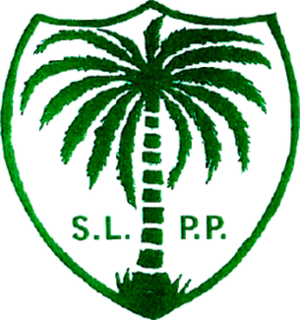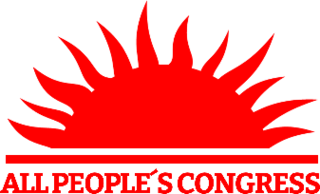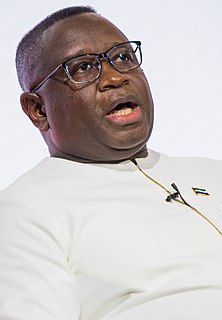Related Research Articles

Alhaji Ahmad Tejan Kabbah was a Sierra Leonean politician who served twice as the 3rd President of Sierra Leone, from 1996 to 1997 and again from 1998 to 2007. An economist and attorney by profession, Kabbah spent many years working for the United Nations Development Programme. He retired from the United Nations and returned to Sierra Leone in 1992.

The Sierra Leone People's Party (SLPP) is one of the two major political parties in Sierra Leone, along with its main political rival the All People's Congress (APC). It has been the ruling party in Sierra Leone since April 4, 2018.
Siaka Probyn Stevens was the leader of Sierra Leone from 1967 to 1985, serving as Prime Minister from 1967 to 1971 and as President from 1971 to 1985. Stevens' leadership was often characterized by patrimonial rule and self-indulgence, consolidating power by means of corruption and exploitation.

The All People's Congress (APC) is one of the two major political parties in Sierra Leone, the other being it main political rival the Sierra Leone People's Party (SLPP). The APC is the main opposition party in Sierra Leone since 4 April 2018 when Julius Maada Bio of the SLPP won the 2018 presidential elections, though it maintains a majority in parliament.

Julius Maada Wonie Bio is a Sierra Leonean politician, and the current president of Sierra Leone since 4 April 2018. He is a retired brigadier general in the Sierra Leone Army and was the military head of state of Sierra Leone from 16 January 1996, to 29 March 1996, in a military junta government known as the National Provisional Ruling Council (NPRC). As the candidate of the main opposition Sierra Leone People's Party (SLPP), Bio defeated Samura Kamara of the ruling All People's Congress (APC) in the runoff vote of the 2018 Sierra Leone presidential election with 51.8% of the votes to Kamara's 48.2%. International and local observers declared the election free and fair. Bio succeeded Ernest Bai Koroma as president. As the main opposition leader, Bio was a critic of his predecessor president Ernest Bai Koroma and his administration. As president, Bio has overturned most of the policies of Ernest Bai Koroma, whom he accuses of corruption, and the two men rarely speak to each other.
The People's Movement for Democratic Change (PMDC) is a liberal party in Sierra Leone. It is a breakaway faction of the Sierra Leone People's Party (SLPP). It was officially registered on 19 January 2006. The party is led by Charles Margai, the son of Sierra Leone's second prime minister Sir Albert Margai and the nephew of Sir Milton Margai. The PMDC is based in the country's second largest city of Bo.
Charles Francis Kondo Margai is a Sierra Leonean politician and constitutional lawyer who served as Attorney General and Minister of Justice of Sierra Leone in 2018.
Solomon Ekuma Dominic Berewa was Vice-President of Sierra Leone from May 2002 to September 2007. Standing as the candidate of the Sierra Leone People's Party (SLPP), he was defeated in the second round of the 2007 presidential election by Ernest Bai Koroma of the All People's Congress (APC).
Dr. John Albert Musselman Karefa-Smart was a Sierra Leonean politician, medical doctor and university professor. He served as the first Foreign Minister under Sierra Leone's first Prime Minister, Sir Milton Margai. He was an ordained Elder of the United Methodist Church.
Alhaji Amadu Jalloh is a politician in Sierra Leone. He contested the 1996 presidential election as a member of the National Democratic Alliance, where he finished in 8th place with 2.3% of the first round voting. He ran again as the NDA candidate in the August 2007 presidential election, receiving 0.96% of the vote and fifth place.

Ernest Bai Koroma is a Sierra Leonean politician who served as the fourth President of Sierra Leone from 17 September 2007 to 4 April 2018.
Abass Chernor Bundu is a Sierra Leonean politician, diplomat, and the current Speaker of the Sierra Leone House of Parliament, in office since April 25, 2018. Bundu was elected speaker by receiving 70 votes in Parliament. The main opposition the All People's Congress, which won the most seats in Parliament, boycotted the election process in protest and did not nominate a candidate for speaker Archived 26 April 2018 at the Wayback Machine. Bundu is a veteran politician, and a very close ally and personal friend of Sierra Leone"s president Julius Maada Bio
Andrew Turay is a Sierra Leonean politician. He competed in the 1996 presidential election as part of the National People's Party (NPP). He received 0.5% of the vote.

Kailahun District is a district in the Eastern Province of Sierra Leone. Its capital and largest city is the town of Kailahun. The second most populous city in the district is Segbwema. Other major towns in Kailahun District unclude Koindu, Pendembu and Daru. As of the 2015 census, the district had a population of 525,372. Kailahun District is subdivided into fourteen chiefdoms.

Kenema District is a district in the Eastern Province of Sierra Leone. Its capital and largest city is Kenema, which is the third most populous city in Sierra Leone, after Freetown and Bo. Tongo is the second most populous city in the district. Other major towns in Kenema District include Blama and Yomboma. The district is the most populous district in the Eastern province with a population 609,873. Kenema District has an area of 6,053 km2 (2,337 sq mi) and comprises sixteen chiefdoms.

General elections were held in Sierra Leone on 11 August 2007. Seven candidates competed in the first round of the presidential election; no candidate received the necessary 55% of the vote to win in the first round, and a second round was held between the top two candidates, Ernest Bai Koroma of the All People's Congress (APC) and Solomon Berewa of the Sierra Leone People's Party (SLPP), on 8 September. According to official results, Koroma won the election with 54.6% of the vote.
Dr. Kandeh Baba Conteh is a Sierra Leonean politician and political scientist. He is the leader of the Peace and Liberation Party (PLP).

General elections were held in Sierra Leone on 26 and 27 February 1996 to elect the President and members of Parliament, with a second round of the presidential election on 15 March. They were the first elections since multi-party democracy had been reintroduced following a referendum on a new constitution in 1991, and the first multi-party elections held in the country since 1977.

In April 1961, Sierra Leone became politically independent of Great Britain. It retained a parliamentary system of government and was a member of the British Commonwealth of Nations. The Sierra Leone People's Party (SLPP), led by Sir Milton Margai were victorious in the first general election under universal adult franchise in May 1962. Upon Sir Milton's death in 1964, his half-brother, Sir Albert Margai, succeeded him as Prime Minister. Sir Albert attempted to establish a one-party state had the ready cooperation of the opposition All People' Congress but met fierce resistance from some cadre within his party Sierra Leone People's Party (SLPP) and ultimately abandoned the idea.

General elections were held in Sierra Leone on 7 March 2018 to elect the President, Parliament and local councils. Incumbent President Ernest Bai Koroma did not run for another term, as he was constitutionally ineligible, having served the maximum ten years in office.
References
- ↑ National Electoral Commission – 2012 Nominated Candidates. Retrieved January 1, 2018. (Wayback Machine archive from April 28, 2013)
- ↑ ELECTIONS STALEMATE AS 55% PROVES BEYOND REACH OF SIERRA LEONE'S LEADING POLITICAL PARTIES focus-on-sierra-leone
- ↑ SLPP Archived 2007-10-22 at the Wayback Machine List of SLPP parliamentarians